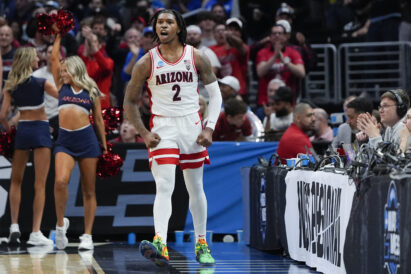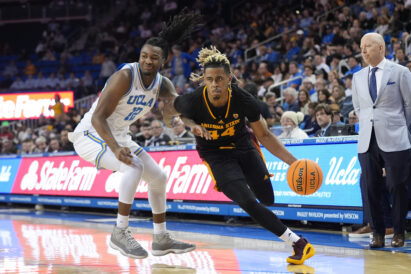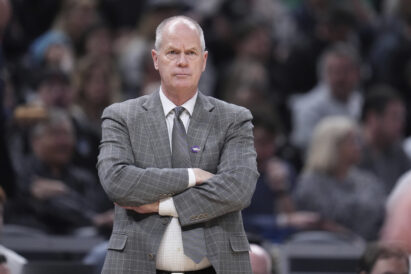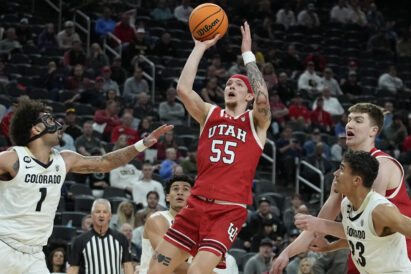As the identities of college basketball conferences continue to shift wildly from one season to the next, it’s pretty clear that the Big 12 Conference will still have a lot to say about the result of the 2024-25 men’s basketball season.
Both CBS and ESPN have KU at No. 1 in early preseason rankings and three other Big 12 schools — Houston, Iowa State and Baylor — in the top seven.
The league didn’t quite live up to expectations in March’s NCAA Tournament, in part because No. 1 seed Houston lost Jamal Shead to injury during its hard-fought Sweet 16 game against Duke. But certainly plenty of representatives of the league will once again put themselves squarely in the postseason conversation next year.
A few may be doing so for the first time as part of the Big 12.
Arizona guard Caleb Love (2) celebrates after scoring during the second half of a Sweet 16 college basketball game against Clemson in the NCAA tournament Thursday, March 28, 2024, in Los Angeles.
Arizona
Among the four new schools joining the league this year, Arizona is the headliner when it comes to men’s basketball. The Wildcats have had three excellent regular seasons under Tommy Lloyd, although haven’t made it past the Sweet 16, with 2023’s first-round upset loss to Princeton a black mark on Lloyd’s run so far.
To a greater extent than their schools’ respective football teams, whose seasons are three months away, these basketball teams have their rosters in flux. Arizona just lost two highly touted prospects, Joson Sanon and Jamari Phillips, in the span of a week.
Those decommitments came shortly after Caleb Love, the reigning Pac-12 Conference player of the year who once played against KU in the national championship for North Carolina, announced he was returning to school. That was a massive victory for the Wildcats, given that Love was an 18-point-per-game scorer and their four next highest scorers — Oumar Ballo, Pelle Larsson, Keshad Johnson and Kylan Boswell, who comprised the rest of the starting lineup — are all gone to either other schools or the draft.
The Wildcats will instead need to rely on some of their more significant bench pieces like guards Jaden Bradley (7.0 points, 2.4 rebounds) and KJ Lewis (6.1, 3.1) moving into greater roles, as well as highly touted, more experienced transfers like Anthony Dell’Orso (19.5 points and 6.5 rebounds for Campbell last season) and Trey Townsend (17.3 points and 8.1 rebounds for the Oakland team that upset Kentucky in the tournament).
Arizona State guard Adam Miller (44) drives past UCLA guard Sebastian Mack (12) during the first half of an NCAA college basketball game Saturday, March 9, 2024, in Los Angeles.
Arizona State
The team that flipped Sanon, and then lost Topeka native Bo Aldridge (a familiar name to Kansans), ASU has not made it past the first round of the NCAA Tournament since 2009, and is coming off a poor season that featured losing records both in the Pac-12 and overall.
The hope for the Sun Devils resides in their incoming freshman class, and particularly center Jayden Quaintance, a 6-foot-9, 230-pound center from Word of God Christian Academy in Raleigh, North Carolina, who is one of the top prospects in the country.
Bobby Hurley’s squad will bear practically no resemblance to the one that struggled last season, except in its retention of guard Adam Miller, formerly of Illinois and LSU, who started the year uncertain of whether he would play due to two-time transfer rules and finished it averaging 12 points per game.
Hurley picked up a few key mid-major transfers in April, led by BJ Freeman, a 6-foot-6 guard who was one of the nation’s highest-scoring players when he averaged 21.1 points per game at Milwaukee last season.
Colorado head coach Tad Boyle is seen on the sidelines during the first half of a second-round college basketball game against Marquette in the NCAA Tournament, Sunday, March 24, 2024 in Indianapolis.
Colorado
Most familiar to KU fans will be the faces on the Buffaloes’ bench. Head coach Tad Boyle and newly hired assistant coach Danny Manning were teammates for the Jayhawks back in the day, not to mention that Manning was an assistant to Bill Self in the not-too-distant past.
Boyle, who took over during CU’s final year in the Big 12 (the 2010-11 season), has molded the Buffaloes into a much more formidable team than they were back when they were playing the Jayhawks on a regular basis. They have made the tournament six times in 14 seasons, and their 26 wins in the 2023-24 campaign were the most in program history. CU beat Boise State in the First Four and Florida in the first round before taking a narrow loss to Marquette.
Next year’s squad will look a lot different, with KJ Simpson, Tristan da Silva and Cody Williams all headed to the NBA and a few more seeking other destinations in the transfer portal.
Boyle is relying on talent to make the leap from lower levels of competition, including Division II All-American forward Trevor Baskin from Colorado Mesa and Bevo Francis Award-winning (for the nation’s best “small college basketball” player) center Elijah Malone, from Grace College in the NAIA. Those two and Washington State transfer Andrej Jakimovski provide plenty of collegiate experience, if not in a league like the Big 12, as they are all graduate transfers.
Utah guard Gabe Madsen (55) shoots over Colorado during the first half of an NCAA college basketball game in the quarterfinal round of the Pac-12 tournament Thursday, March 14, 2024, in Las Vegas.
Utah
Utah is another team that continues to see its roster change as the calendar flips to June. The Utes picked up the commitment of Mike Sharavjamts, a 6-foot-8 San Francisco transfer guard originally from Mongolia, on Monday, not long after getting East Carolina forward Ezra Ausar.
Much like ASU, Utah will enter its Big 12 life looking for a level of postseason success it hasn’t attained in quite some time, except the Utes haven’t even made the NCAA Tournament since the 2015-16 season. Craig Smith led the team to its first postseason appearance of his tenure this spring, a lengthy NIT run that ended with a semifinal loss to Indiana State.
The star of last year’s squad, 7-foot center Branden Carlson, has exhausted his eligibility after five seasons in the program. The Utes do return a 37-game starter in fifth-year senior guard Gabe Madsen, who averaged 13.6 points and 3.9 rebounds last season, and they’ll still have plenty of size inside in the form of 7-foot-1 Lawson Lovering.
Besides Ausar and Sharavjamts, Madsen’s twin brother Mason, who previously played with him at Cincinnati and was most recently at Boston College, joins the squad. The rest of the transfer group includes forwards Keanu Dawes (Rice) and Zach Keller (Wake Forest) and a recent Big 12 face in guard Miro Little (Baylor), as Utah looks to bolster its talent ahead of the conference shift.
 AP Photo/Ashley Landis
AP Photo/Ashley Landis
 AP Photo/Ryan Sun
AP Photo/Ryan Sun AP Photo/Jae C. Hong
AP Photo/Jae C. Hong AP Photo/Michael Conroy
AP Photo/Michael Conroy AP Photo/John Locher
AP Photo/John Locher